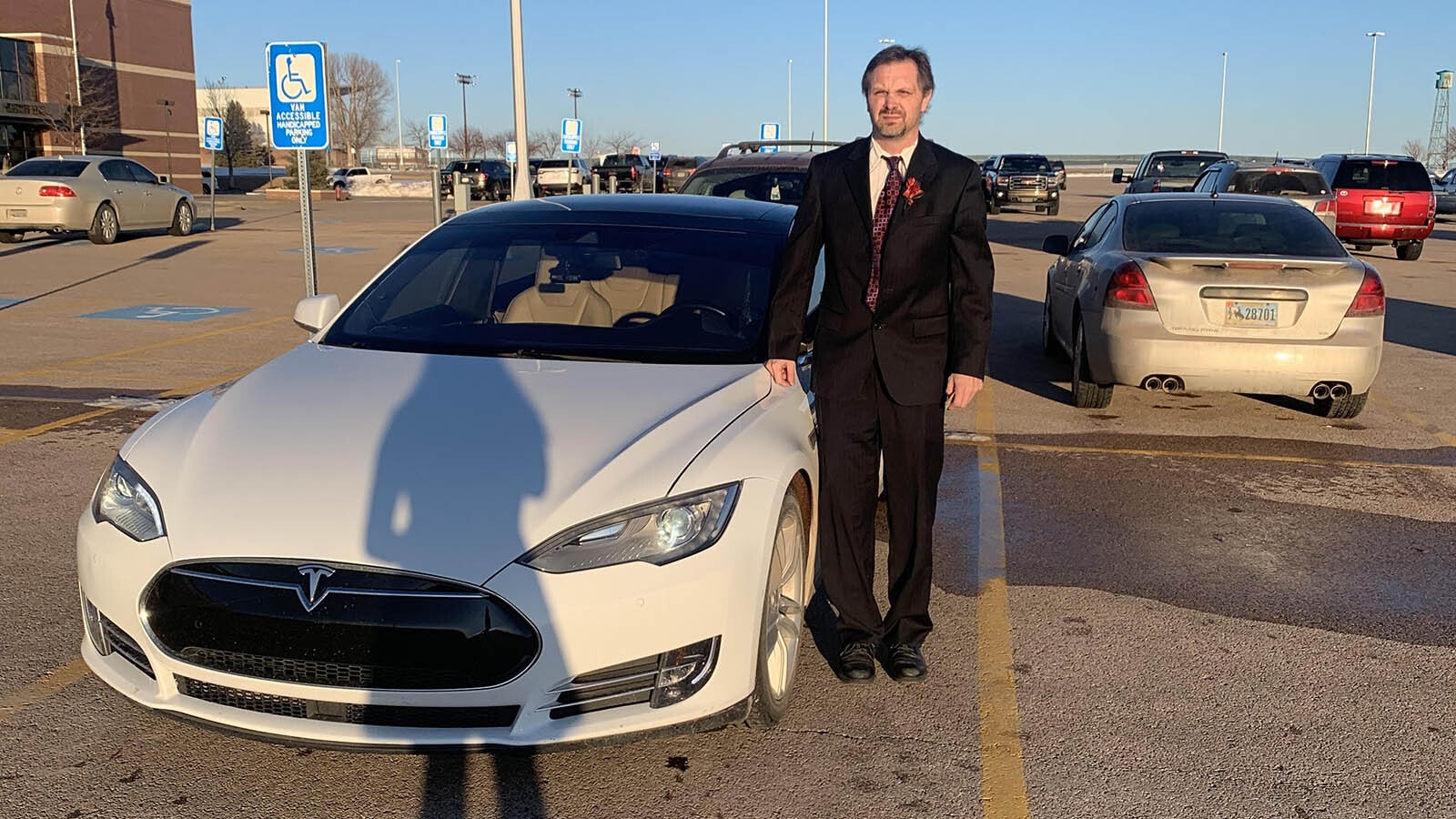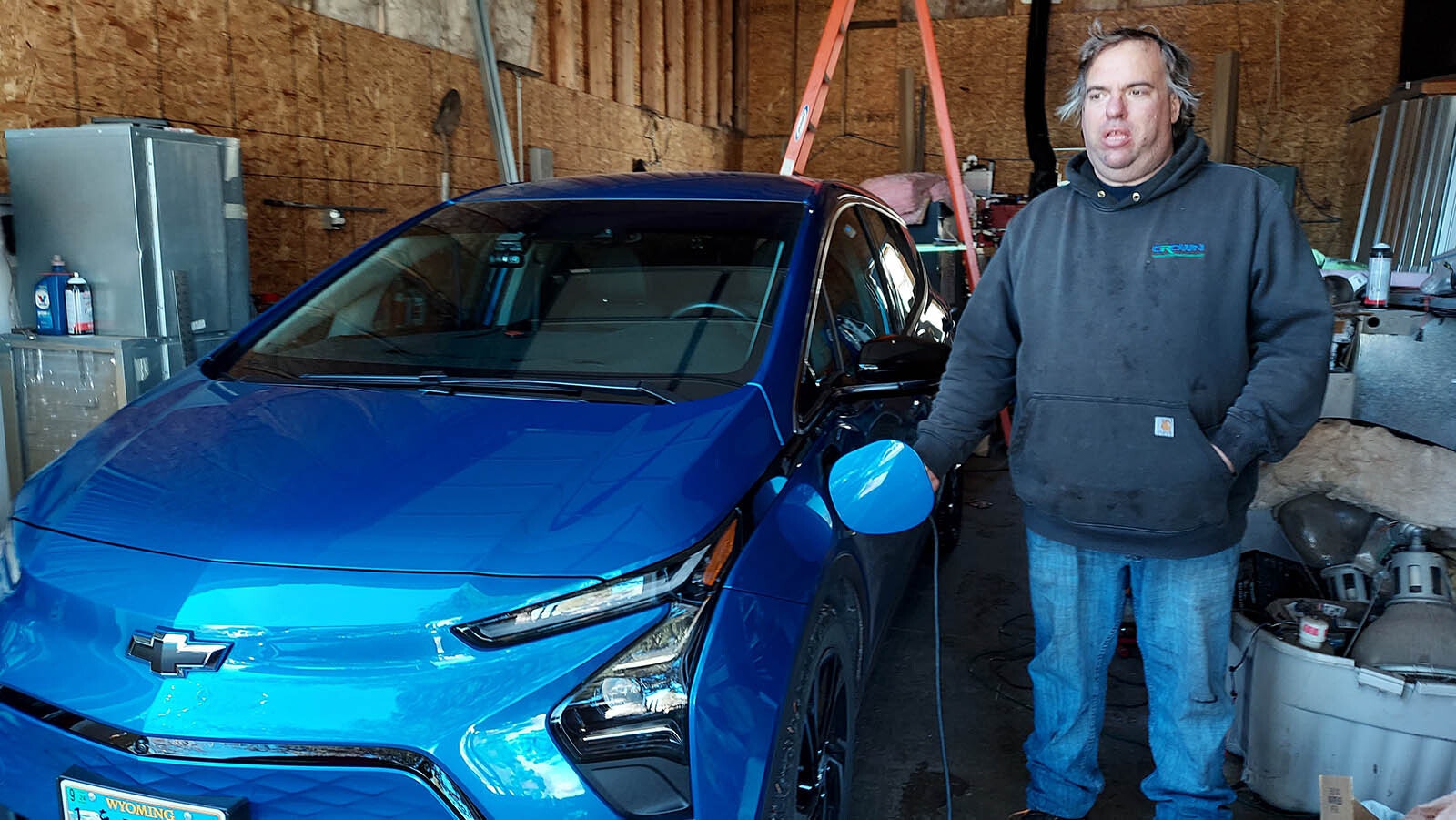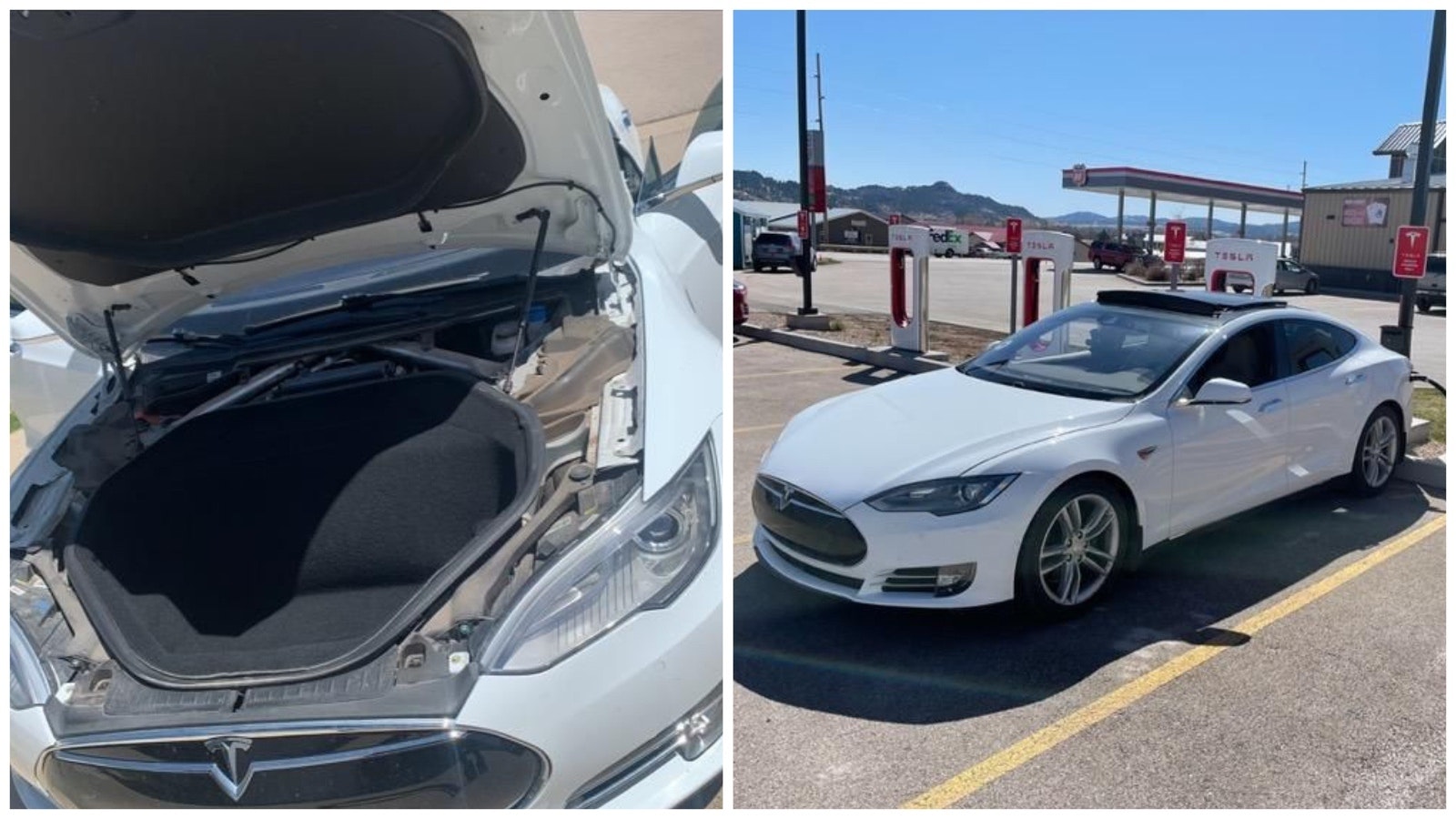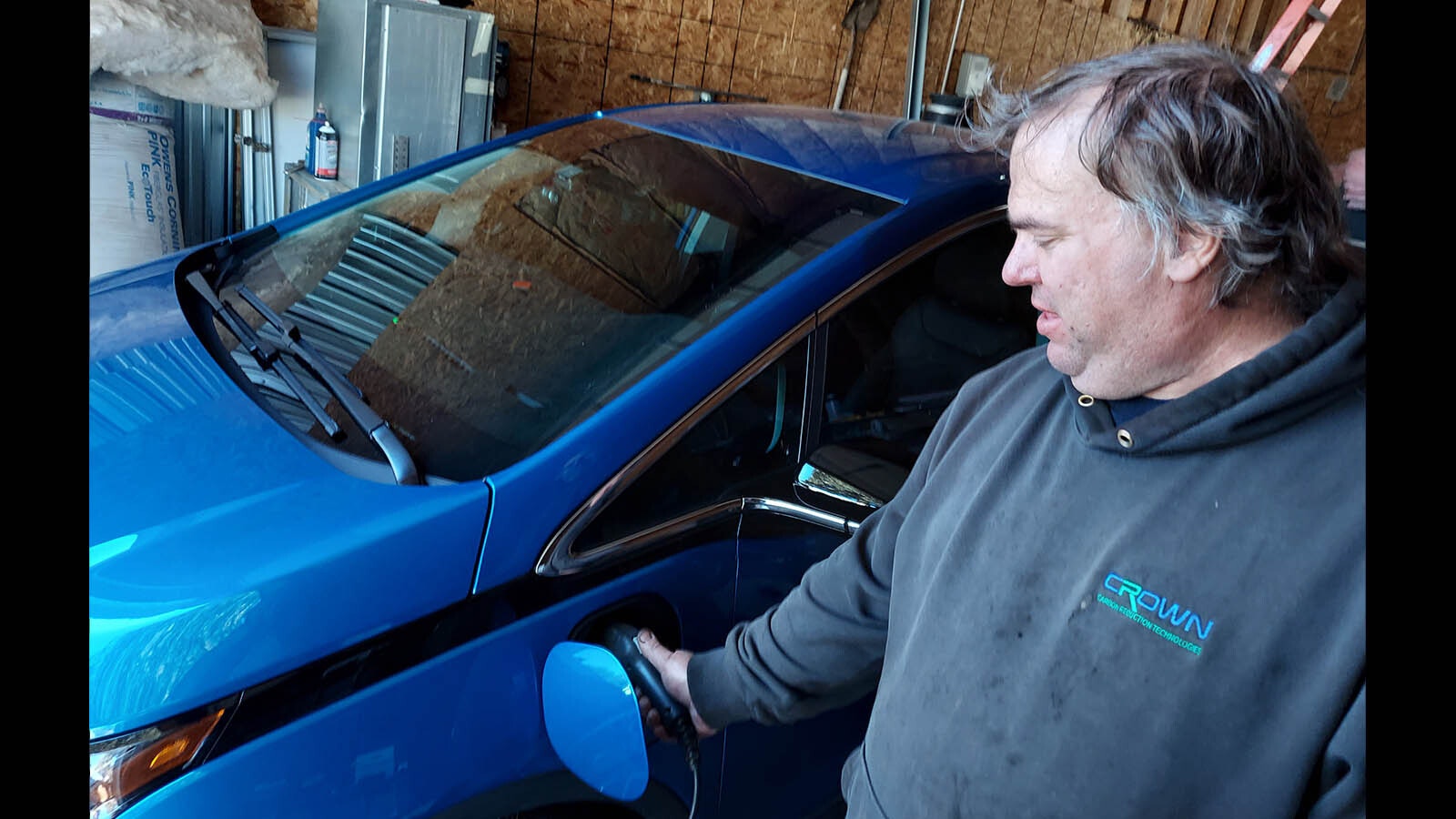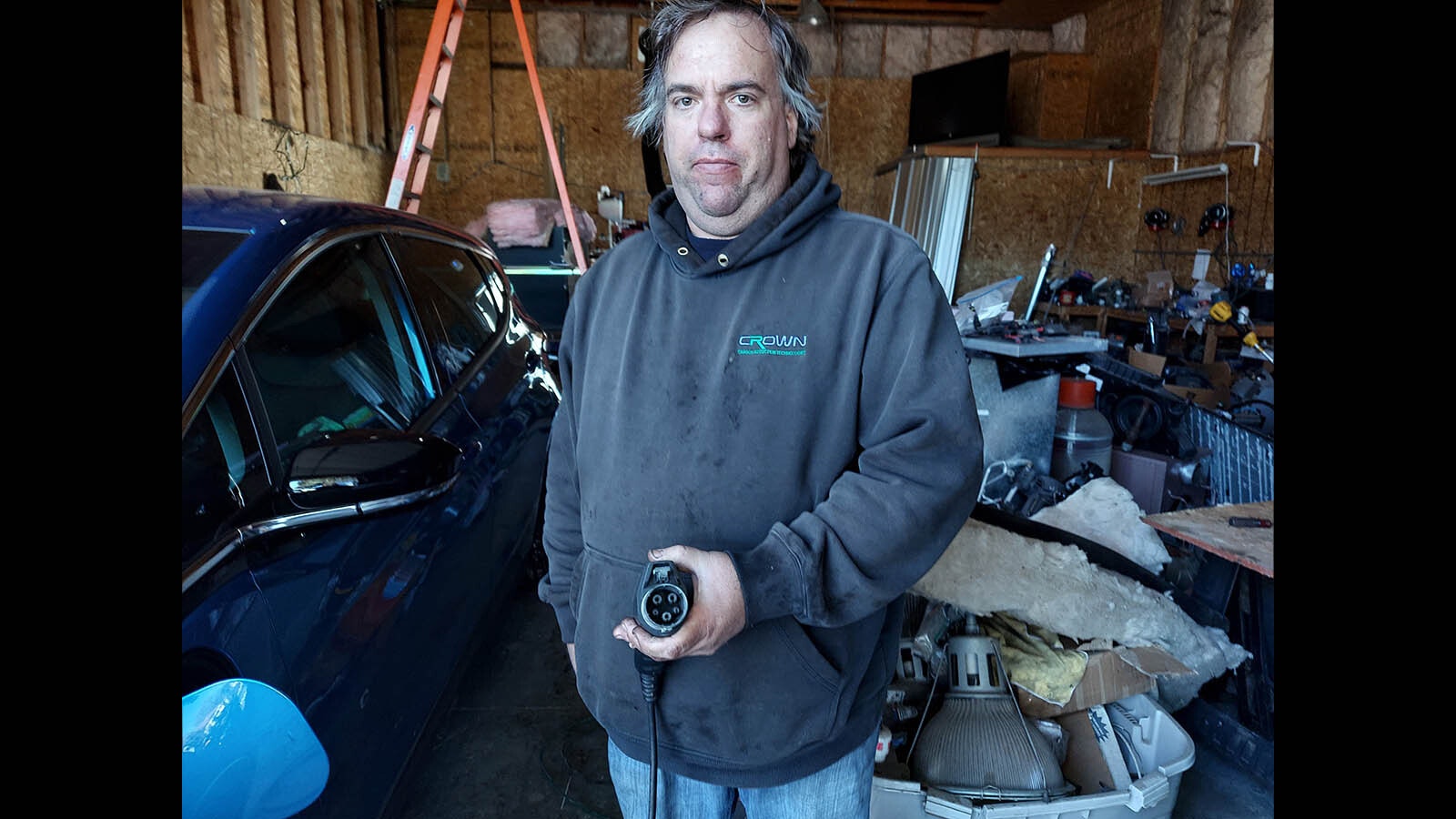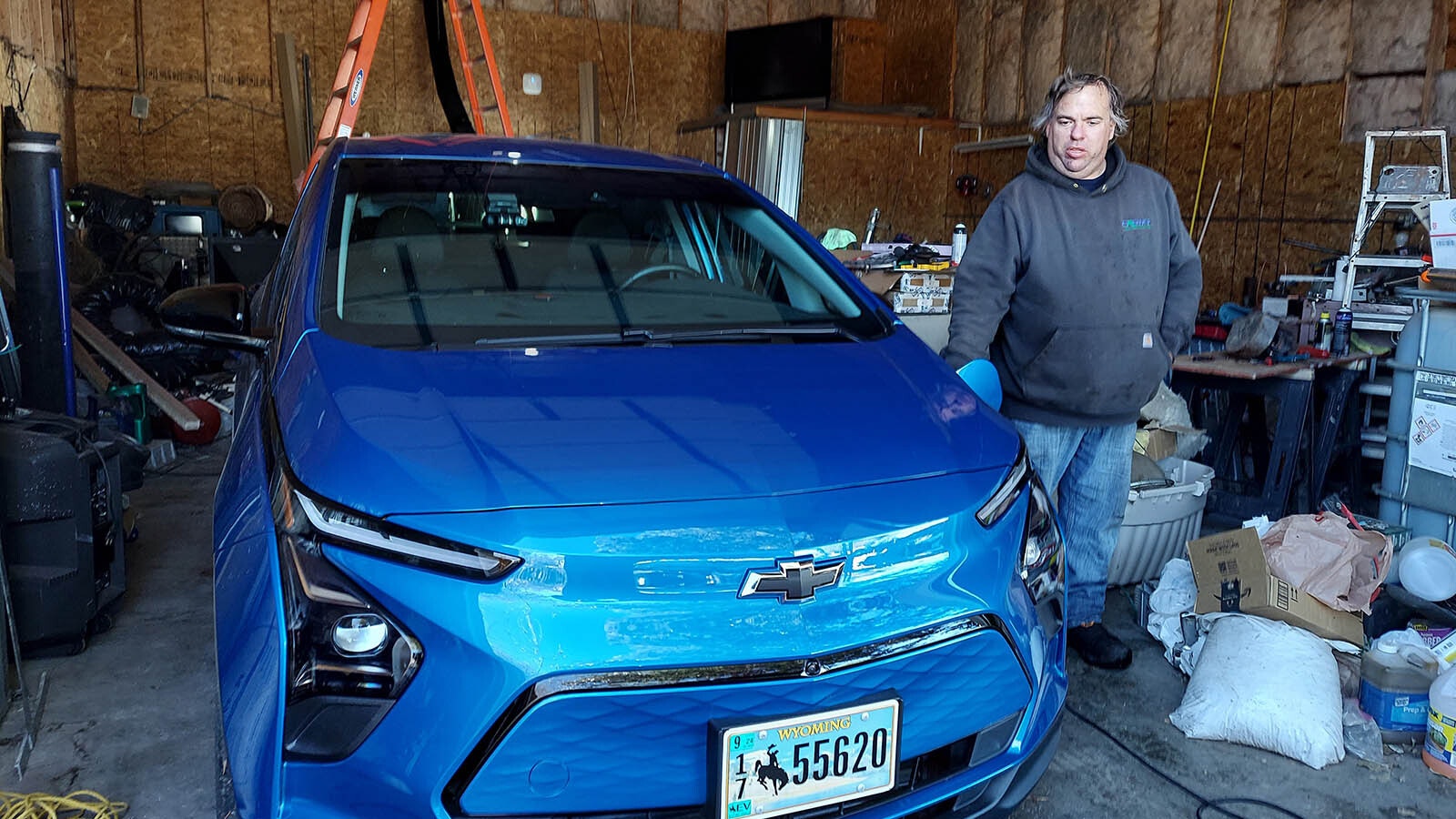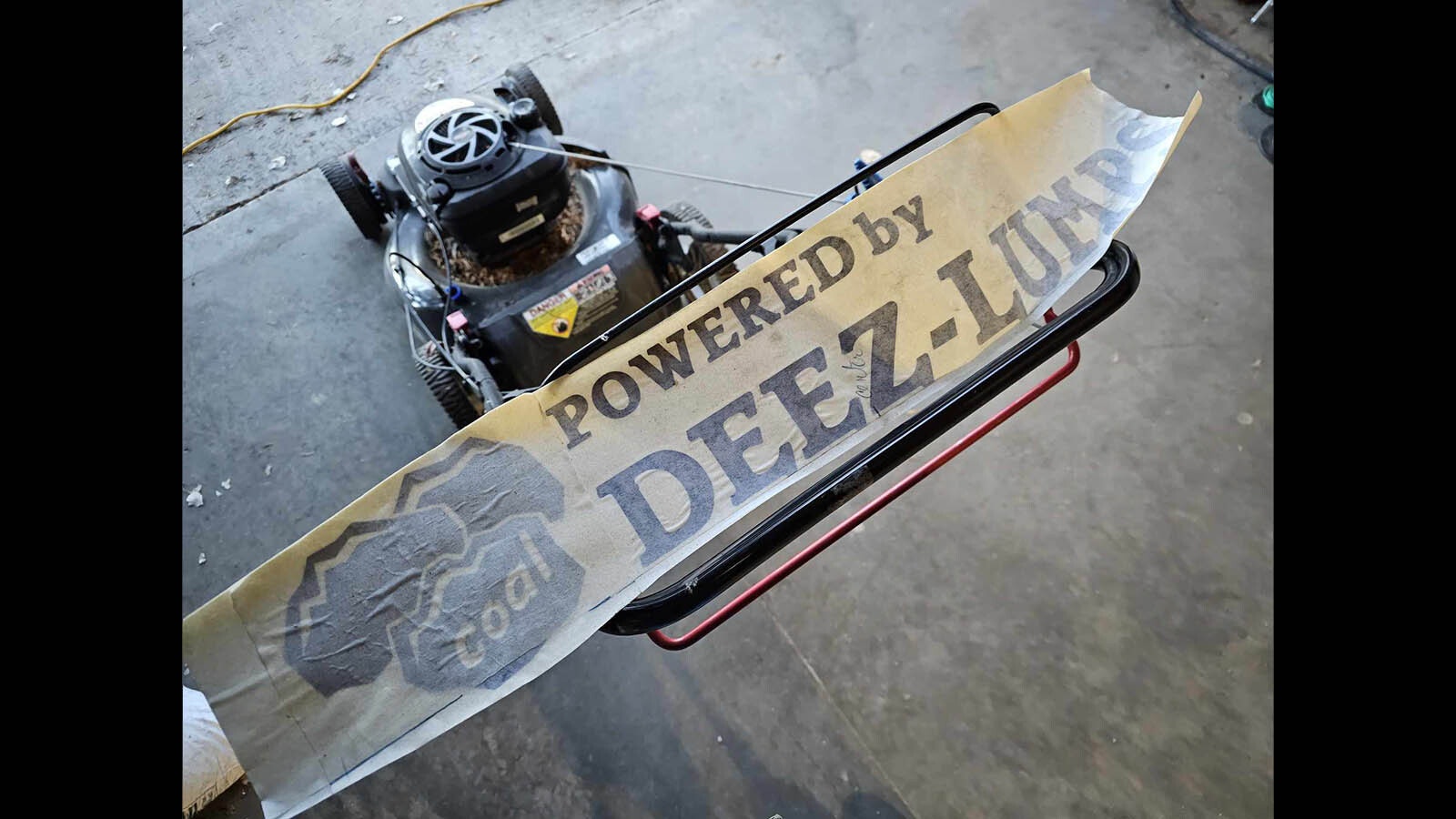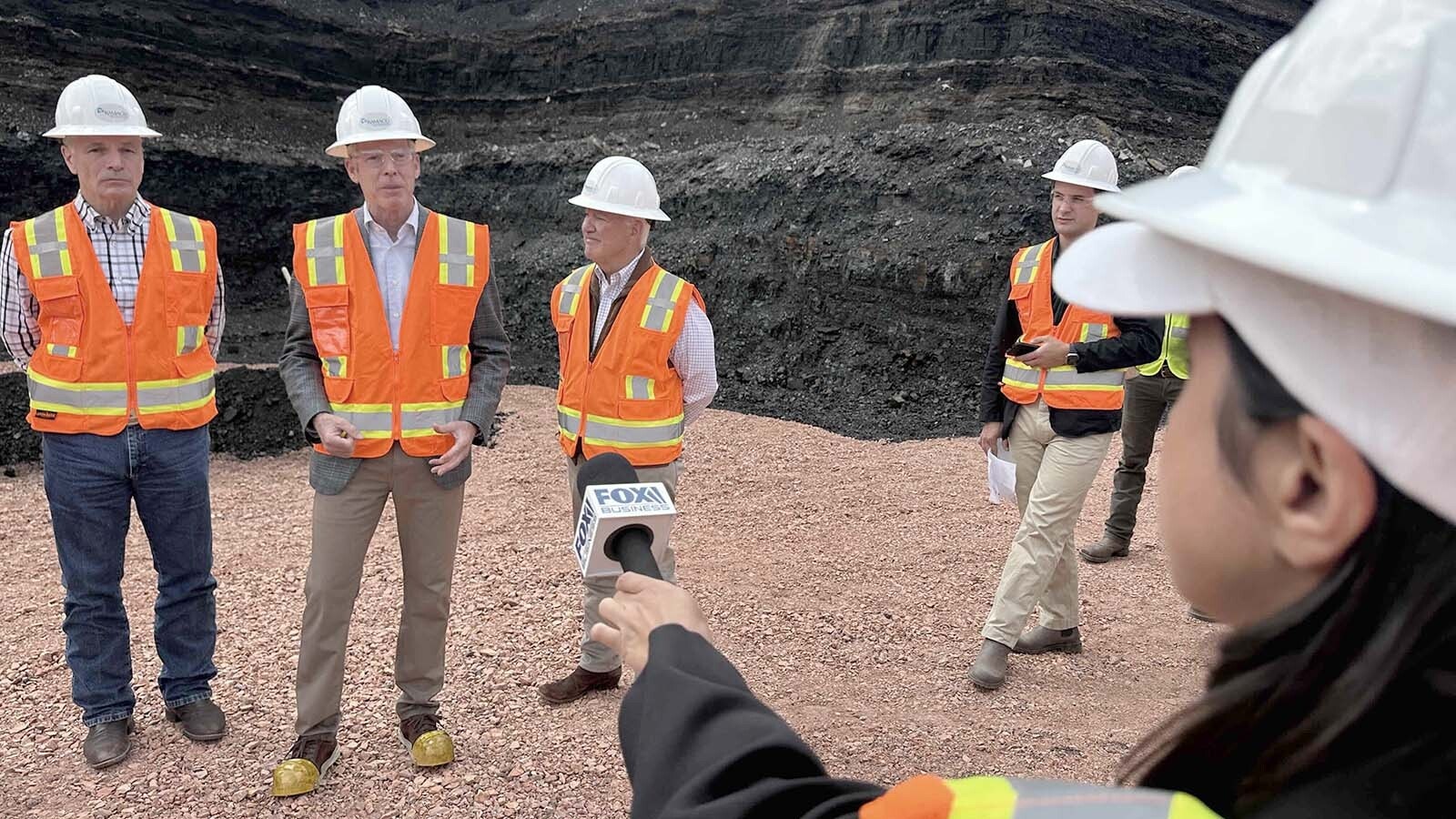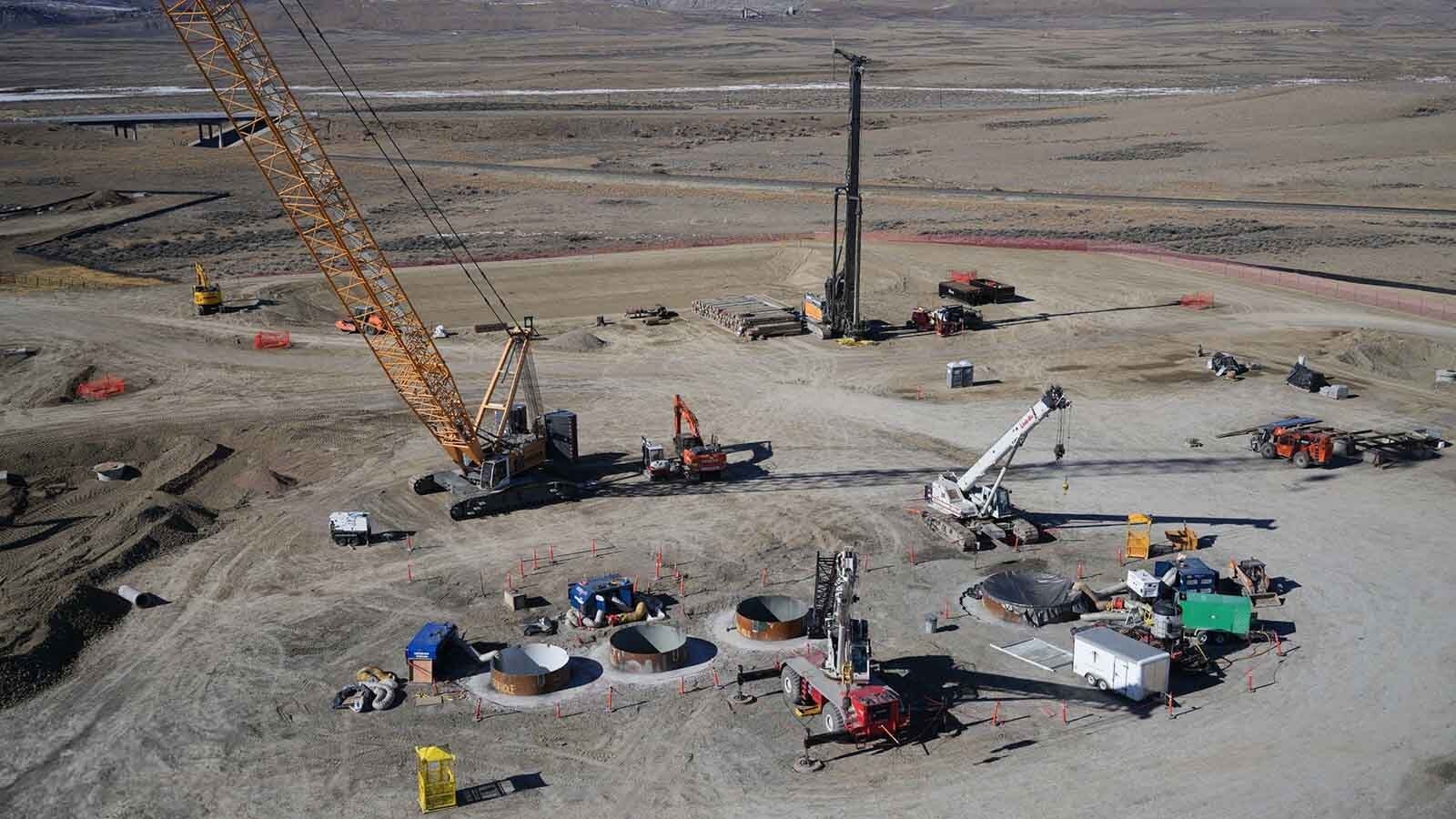Robert Avery’s hybrid electric Chevy Volt has a telling sticker on it that tends to raise eyebrows whenever he’s driving the car around Gillette.
The sticker proclaims in giant letters: “Powered by Deez-Lumps.” Next to that slogan are three black lumps labeled “coal.”
To Avery, the sticker is a bit of a conversation starter, one he’s happy to have with critics of the fossil fuel industry and co-workers in the coal industry alike.
He likes the sticker so well, in fact, he’s thinking of having a duplicate made for his newly acquired Chevy Bolt, which is an all-electric vehicle, no gas at all.
Avery’s not the only one driving an electric vehicle around Gillette, which is the heart of Wyoming’s coal country. There’s also Don Adams, who drives a Tesla for Uber.
“I get a lot of crap about it, because they’ll say, ‘Oh, you don’t realize that you’re in coal country,’” Adams said about the initial reaction some have to his EV. “And then I tell them that I know where my electricity comes from, and it’s coal. I’m not from California, and I don’t have my head stuck in the sand.”
Where Coal Is Born
Of course, driving any electric vehicle around Gillette can be a little like waving a red flag at a bull. It’s bound to get noticed, and it’s bound to start something, even if it’s just a heated conversation.
Gillette prides itself on its energy industries as The Energy Capital of the Nation. It’s the epicenter of the Powder River Basin, which not only produces lots of oil and natural gas, it also produces 97% or more of the Cowboy State’s coal. It produces so much thermal coal that it’s measured in millions of tons.
Wyoming, meanwhile, produces about 40% of America’s thermal coal by itself, making it the largest state producer in the country.
The Powder River Basin’s coal beds are particularly advantaged. Not only are they low-sulfur, which burns cleaner than other forms of coal, the deposits are very near the surface, which makes them easy and cost-effective to mine.
The amount of coal leaving the Powder River Basin is astonishing.
Multiple 80-unit trains of coal leave the Powder River Basin every day, according to Visit Cheyenne. A unit train is a block of train cars that all carry the same commodity. There are generally more than 90 rail cars in one unit train.
That puts the rate of coal mining in Gillette at an eye-popping 12 new tons every second.
So, people take coal very seriously in Gillette, and electric vehicles, produced by companies whose stated mission is the reduction of fossil fuel use, aren’t likely to find much love.
Curiosity Gets The Cat Every Time
Both Avery and Adams say they are well aware that coal is the bedrock for Gillette’s economy, and neither bought an electric vehicle out of any particular environmental concern.
“For me it was curiosity,” Avery told Cowboy State Daily. “I picked up the hybrid I think in 2019, and it’s a 2017 Chevy Volt. I saw it become available at a local car dealer here and, like, you know, I’m kind of curious.”
Avery wondered, for one thing, why so many people were buying electric vehicles if they suck as badly as he’d read. So, he went in to test drive the Volt one day just to see for himself what all the fuss was about.
“I had a very negative bias going into it,” he said. “This thing is going to be slow, it’s going to be a pooch, all of the negative stuff you hear about it. Where am I going to plug it in? You know, it’s going to take hours and days and weeks and months and years for it to charge. All the BS that comes about an EV.”
Avery admits the Volt is very slow when it comes to charging. It takes 45 minutes to gain the same charge that a Tesla does in 15 minutes.
But the car’s handling was a real shocker, particularly as compared to the diesel he’d bought.
While his diesel was always very slow to accelerate, making him nervous crossing traffic, the Chevy Volt didn’t seem to realize it’s not a sports car.
“You stand on the throttle, and you’re gone,” he said. “I’m like, ‘Wow, I can’t do that with my diesel, because I have to wait for the turbo to get its act together.’ So, that kind of shot holes in the story that our electric cars are slow and have no power.”
The James Bond Silencer
During his test drive, Avery was also impressed with the car’s silent engine, as well as how well the air conditioning worked, despite it being a hot summer day.
“That just totally blew my mind,” he said. “It’s sitting out in the sun, and the engine’s not running at all, so there’s no sound. No sound at all. I’m like, ‘Wow, everything on this silly thing is electric. It all runs off the battery.’”
Avery’s Uber riders are also taken aback by how silent the vehicle is, and that usually starts a conversation with them about hybrids and all-electric vehicles. In fact, he keeps the car’s energy display up to make sure customers notice that this car is different.
After his first test drive, Avery joined online groups to find out more about hybrid and electric vehicles. As a result of that research, he found Gillette was in something of a charging desert when it comes to everything but Teslas.
But that didn’t deter him. Instead, he installed his own charging unit, buying it used on eBay, and then listed its availability to fellow EV travelers on an app called Plug Share.
“No one has used it yet, but it’s available,” Avery said.
A Godfather Moment
Adams bought his Tesla used from a friend because the friend made him an offer he just couldn’t refuse.
“Another Uber driver had bought it and then three months later he wanted to buy a different one,” Adams said. “And my Tesla came with free lifetime charging.”
Adams was spending $400 a month on gasoline, but now he’s spending nothing at all — unless he wants to plug it in at home for convenience.
That is costing him about $50 a month, so far. Much less than the $400 he was paying.
Repair-wise, he’s spent $2,950 so far after owning the car for four years. He biggest repair was for the battery, which cost around $2,500. The battery was under warranty, but it turned out a seal protecting the battery from water damage wasn’t. Now that he knows that, he will be much more careful about driving through water.
By the time Adams reaches year seven of owning the used Tesla, his gasoline savings will have paid for the purchase price of his car.
He believes it is likely he can own the car longer than that. The car’s battery generally lasts for more than 300,000 miles if cared for properly, and he’s right around the halfway point on that.
He’s had no problems taking the Tesla on long road trips, even in winter, and he loves the self-driving feature, though he is first to admit the range does drop substantially when it’s cold.
“There are things you can do to alleviate some of that,” he said. “Like, if you have your battery warm to begin with and keep it warm, you get further milage.”
His daughter, in fact, drove the car all the way to Casper last year when it was 20 below.
Still Saving
Although Avery doesn’t get lifetime free charging like Adams, he told Cowboy State Daily he is still saving quite a bit of money by driving his electric vehicles versus a gas-powered vehicle.
A recent trip to Casper, for example, cost him $12 in charging fees for a 130-mile trip.
“Break that down into gas or diesel prices at $4 a gallon, and that’s what, three gallons? You’d better make 40 miles to the gallon or better for it to be cheaper on gas,” he said.
He’s also not having to worry about oil changes all the time, and maintenance costs so far have been negligible.
“I bought snow tires for it, and then I wore out the original set of tires that were on it,” Avery said. “The snow tires were options because my safety was involved. I didn’t need snow tires, but I wanted them.”
The hybrid still requires occasional oil changes, because it still has its gas engine, but it doesn’t require regular tune-ups to deal with things like spark plugs and timing belts or any of “that nonsense,” Avery said.
“So even on the hybrid, (costs) are very reduced,” he said. “The hybrid really doesn’t run the engine all that much. I think the oil change interval is like 20, 25,000 miles.”
Range Reduction Is Real
Range reduction, meanwhile, is very real when the weather is cold, Avery said, but it’s something he’s just aware of when he’s traveling. He knows how far the vehicle can go, he knows where his charging stations are, and he plans accordingly. If he’s taking a longer-distance trip, he drives a little more conservatively to preserve engine power.
To those he meets along the way who think electric vehicles are worthless, and to those who think it’s the very best, he gives the same advice.
“My thing with everyone is, take a test drive,” he told Cowboy State Daily. “You might be wildly surprised.”
Renée Jean can be reached at renee@cowboystatedaily.com.

